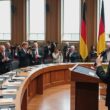The Alternative for Germany (AfD) is openly signaling its intention to emulate Donald Trump’s hardline immigration policies should the party ever assume power, a move drawing sharp criticism and raising concerns about potential shifts in German domestic policy. AfD faction leader Tino Chrupalla explicitly lauded Trump’s approach, stating that many of the former president’s promises on migration during his campaign directly align with the AfD’s platform. He further highlighted what he perceived as an improvement in Trump’s implementation this time around, attributing it to “good personnel.
Chrupalla’s comments come amidst heightened scrutiny of U.S. border enforcement tactics, including instances of forceful responses and reported brutality against migrants. While attempting to distance the AfD from endorsing violence, Chrupalla insisted that states retain the sovereign right to determine who is permitted entry, particularly concerning individuals entering the country illegally. This assertion, while ostensibly advocating for national sovereignty, has been interpreted by critics as a justification for potentially restrictive and uncompromising immigration control measures.
The AfD leader’s remarks also shed light on the party’s internal power dynamics and potential cabinet appointments should it gain control. Chrupalla indicated that Björn Höcke, a prominent and controversial figure within the AfD known for his inflammatory rhetoric, is a leading contender for a ministerial position within a hypothetical AfD government. Deflecting concerns about Höcke’s past statements and association with far-right circles, Chrupalla dismissed any label of extremism directed at the Thuringia politician.
The open embrace of Trump’s policies represents a significant escalation in the AfD’s rhetoric and strategy, likely to fuel debate on the future direction of German immigration policy and the potential for a further normalization of extremist viewpoints within mainstream political discourse. Experts warn that the AfD’s emulation of U.S. policies could lead to a rollback of human rights protections and exacerbate tensions surrounding immigration within Germany.





